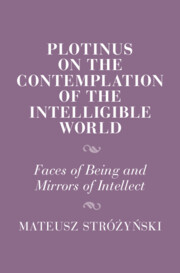Book contents
- Plotinus on the Contemplation of the Intelligible World
- Cambridge Studies in Religion and Platonism
- Plotinus on the Contemplation of the Intelligible World
- Copyright page
- Dedication
- Epigraph
- Contents
- Acknowledgements
- Introduction
- Part I Descent and Fall
- Part II Soul
- Part III Intellect
- 6 Looking into Our Face
- 7 All Together in Eternity
- 8 There Is Only One World
- 9 Pamprosopon
- Conclusion
- Bibliography
- Index
9 - Pamprosopon
from Part III - Intellect
Published online by Cambridge University Press: 03 September 2024
- Plotinus on the Contemplation of the Intelligible World
- Cambridge Studies in Religion and Platonism
- Plotinus on the Contemplation of the Intelligible World
- Copyright page
- Dedication
- Epigraph
- Contents
- Acknowledgements
- Introduction
- Part I Descent and Fall
- Part II Soul
- Part III Intellect
- 6 Looking into Our Face
- 7 All Together in Eternity
- 8 There Is Only One World
- 9 Pamprosopon
- Conclusion
- Bibliography
- Index
Summary
This chapter shows that the entire intelligible world in Plotinus has a personal nature. Every real being is a person, not an abstract concept or a dead thing. Moreover, those real beings don’t exist in separation, and they are not autonomous individuals, but form a unified, living whole, an organism or, as Plotinus calls it, a city with a soul. The Forms are sacred statues of the gods, which can be seen through their sensible images. In the end, Plotinus coins a neologism to describe this peculiar vision of reality: παμπρόσοωπόν τι, “being-all-faces”. This grand vision gives a deeper meaning to all the earlier metaphors of statues, reflected images, and faces that I have been elucidating in the book. In a deep unity of the intelligible world, to know and love one’s own face or to know and love the face of another is to contemplate all the other faces that participate in the living city that is reality.
- Type
- Chapter
- Information
- Plotinus on the Contemplation of the Intelligible WorldFaces of Being and Mirrors of Intellect, pp. 319 - 351Publisher: Cambridge University PressPrint publication year: 2024

